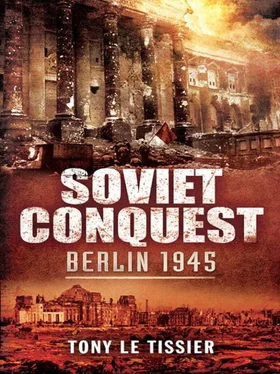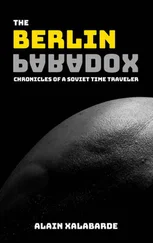‘Vassili Vassilievitch, what can I say? What words can console a father’s heart? Be strong! We will avenge your son and all those who have given their lives in the protection of their country!’
In these last days death still took many men, including comrades with whom I had set out on the difficult road to war. Every loss hit us hard.
After the bloody fighting on the 30th April, and the desperate attempt to break out to the west at any price, the enemy had quietened down. The artillery was silent, tanks did not appear, even the panzerfausts had disappeared. The enemy soldiers had gone into hiding. We chased them out of their hiding places and liberated district after district. In the morning we had sent off a submachine-gun company under young Captain Chadsarakov on reconnaissance. In the northern section of the Reichsstrasse he fell into an ambush and suffered severe casualties. The young, black-eyed Ossete Chadsarakov was killed. Sacha Tinda, the last of the three Charkov Komsomols, also failed to return. Fortunately it transpired that he was only wounded and our neighbours had taken him with them.
In the morning there were rumours of Hitler’s suicide and the capitulation of the Fascist troops in Berlin. No one knew for sure, but everyone sensed that capitulation was imminent.
Towards midday the guns fell silent. We pushed on without coming across resistance. Berlin was burning sky high, buildings collapsing, the thick smarting smoke burning our eyes.
Unexpectedly came the order to strengthen the bombardment. At 1830 hours the whole of our artillery opened a terrific fire, including the Katyushas and the six battalions of the breakthrough artillery division. This mighty blow was largely symbolic. We wanted to force the enemy into capitulating more quickly and unconditionally.
The whole night we moved around the area north of Pichelsberg S-Bahn station. Towards morning the German soldiers began individually or in groups to leave their hiding holes and surrender. We discovered from them that the Berlin garrison had capitulated.
During the course of the day the stream of prisoners increased. Apathetically the soldiers trotted through the destroyed city to the collecting points. They wanted only one thing: to eat and sleep. Whatever came afterwards was of no consequence to them.
Our riflemen brought a large group of prisoners to me. ‘Where shall we take them?’ asked a sergeant. I pointed to a sign with an arrow pointing the way to the collection point. ‘How are the prisoners behaving?’
‘Normally, Comrade Colonel, they are disciplined.’
I then saw that many of the prisoners were wearing neither shoulder straps nor headgear. ‘On the way they are ripping off their shoulder straps and throwing their caps and badges away,’ said the sergeant. ‘They are apparently afraid.’
‘Don’t let them do so, Comrade Sergeant.’
‘One cannot see to everything, Comrade Colonel, they are many and we are only five.’
I went closer to a prisoner whose uniform was incomplete. The way he carried himself indicated he was an officer. ‘Why have you torn off your badges of rank? You are an officer. Are you not ashamed to do so in front of soldiers whose lives you were responsible for only a short time ago? Where is your honour, officer?’
The prisoner looked silently at his boots.
‘That is no officer,’ somebody called out suddenly from the column. ‘He is an Untersturmführer .’
An SS man? That was why he had torn off his badges of rank. He was afraid of having to account for his crimes. There were still many more such as him in the crowd. They wanted to disappear in the mass and now felt conspicuous.
Suddenly the desire to talk with this mob had left me. With a wave of my hand I had the sergeant lead the prisoners away.
We connected all our thoughts about the end of the war and the defeat of Fascism with the victory in Berlin.
The soldiers found it difficult to get away from the customary wartime routine. The tanks drove along close to the buildings and the riflemen crossed the street in bounds. Although no one was firing anymore and no bombs were dropping, the years of being accustomed to it remained in every one of us. It was not only difficult to get away from the war, re-adapting was also not any easier. The war had ended, it had finished! Although we had waited almost 1,500 days for this moment, we had first to get slowly accustomed to it.
We stood in a large room of an undamaged family home. What could we say at this moment? Our faces spoke for us. Dmitriev had tears running down his cheeks. Even the strong-willed Schalunov was weeping. Like a child I wiped my face with my fist and murmured something incomprehensible to him. Serashimov called out loud: ‘We have forced the beast to its knees,’ and damned the Fascists with some choice swearwords. From the street came a thunderous ‘Hurrah!’
I got hold of the chief of staff first: ‘What happens now?’
Yes, what did await us now? For the first time since the beginning of the war I did not know anything further. At random I said: ‘Vassili Matvejevitch, order everyone to remain where they are. The battalions must assemble. The other units must close up to the staff.’
We had heard nothing from the corps staff for several hours.
‘We are superfluous now,’ Dmitriev said pointedly. ‘But that is not bad, no messages, no situation reports, no reprimands, as things progress slowly. All in all an almost paradisiacal life.’
However, the paradise did not last long. The corps staff demanded exact data over the fighting strength of our brigade. Then we received the order to get ready for further tasks.
‘That looks as if we will have to go on fighting,’ said Schalunov uncomfortably.
Once more the staff mechanism got moving. Towards evening the leader of the corps’ political department, Andrei Vladimirovitch Novikov, sought out the brigade. We put our arms around each other, drove to one of the battalions, congratulated the fighters on their victory and returned happily to the command post.
Meanwhile the adjutant and the cook had decorated and set out the table, having found table cloths and crystal glasses in the house. Dmitriev switched on the radio and Levitan’s solemn voice filled the whole building. He read out an order from the commander-in-chief. As the talk was about Rybalko’s tank-men who had particularly distinguished themselves in the storming of Berlin, we jumped up from our seats and a thunderous ‘Hurrah’ drowned out the voice of the speaker.
Tensely we waited for the salute from Moscow, as suddenly the whole building shook and the glasses on the table trembled. We rushed out of the house and could hardly believe our eyes. Shots of all calibres made their way into the sky, including rockets bursting like fireworks. Our brave soldiers were firing their salutes in honour of Moscow, the Party, our homeland and the great Soviet people.
For the first time in ages I was able to sleep undisturbed, in a real soft bed and without my uniform. It was like a gift.
‘Get up! Get up!’ It was Dmitriev’s voice.
In an old soldier’s way I jumped out of my bed and grasped my things. ‘What’s up? A breakthrough?’
‘Nothing’s happened,’ responded Dmitriev laughing. ‘Have you forgotten that we wanted to look around the city today?’
The battalion commanders and staff officers had already assembled in the adjacent room. Pjotr Koshemjakov allocated us to the individual vehicles and gave the drivers their instructions.
We drove through a few neighbouring streets and then turned into Bismarckstrasse, where one saw the same picture everywhere: burning buildings, rubble, destroyed vehicles and a whole sea of white flags. Like on a big washday, bedsheets, hand- and table-cloths and pillow-cases fluttered in the wind.
Читать дальше












